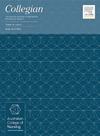利用人工智能提高卫生专业学生的英语语言技能
IF 1.7
4区 医学
Q2 NURSING
引用次数: 0
摘要
有效的沟通技巧对于以患者为中心的护理和安全至关重要。教授口头交流既困难又昂贵。当以英语作为附加语言(EAAL)教学学生时,复杂性会增加。人工智能(AI)在发展语言交际中的应用是对当代问题的创新解决方案。样本:来自三个学科的六名自我认定为EAAL的本科卫生专业学生。方法采用干预前后研究方法。在干预前和干预后分别进行连贯、词汇、语法、发音(CLIP)评估。学生们完成了一份报告,以探讨他们对干预措施的看法。结果两项评分标准均有英语水平的提高。学生报告说,干预有助于他们的会话技巧;然而,它的效力有限,因为它不是人类的。结论人工智能软件可以帮助学生提高英语会话能力;然而,它应该用来补充,而不是取代,传统的教学方法。应促进简报和汇报,以优化学生的学习。本文章由计算机程序翻译,如有差异,请以英文原文为准。
Using AI to improve English language skills in health students
Background
Effective communication skills are essential for patient-centred care and safety. Teaching verbal communication can be difficult and expensive. Complexity can increase when teaching students with English as an additional language (EAAL). The use of artificial intelligence (AI) in developing verbal communication is an innovative solution to a contemporary issue.
Sample
Six undergraduate health students from three disciplines who self-identified EAAL.
Method
A pre–post intervention study was conducted. The Coherence, Lexical, Grammatical, Pronunciation (CLIP) assessment was conducted pre- and post-intervention. Students completed a debrief to explore their perceptions of the intervention.
Results
Improved English language was noted in two criteria of the CLIP. Students reported that the intervention assisted their conversational skills; however, its effectiveness was limited as it was not human.
Conclusion
AI software may support students in developing conversational English skills; however, it should be used to complement, not replace, traditional teaching methods. Briefing and Debriefing should be facilitated to optimise student learning.
求助全文
通过发布文献求助,成功后即可免费获取论文全文。
去求助
来源期刊

Collegian
NURSING-
CiteScore
2.70
自引率
6.70%
发文量
127
审稿时长
72 days
期刊介绍:
Collegian: The Australian Journal of Nursing Practice, Scholarship and Research is the official journal of Australian College of Nursing (ACN).
The journal aims to reflect the broad interests of nurses and the nursing profession, and to challenge nurses on emerging areas of interest. It publishes research articles and scholarly discussion of nursing practice, policy and professional issues.
Papers published in the journal are peer reviewed by a double blind process using reviewers who meet high standards of academic and clinical expertise. Invited papers that contribute to nursing knowledge and debate are published at the discretion of the Editor.
The journal, online only from 2016, is available to members of ACN and also by separate subscription.
ACN believes that each and every nurse in Australia should have the opportunity to grow their career through quality education, and further our profession through representation. ACN is the voice of influence, providing the nursing expertise and experience required when government and key stakeholders are deciding the future of health.
 求助内容:
求助内容: 应助结果提醒方式:
应助结果提醒方式:


